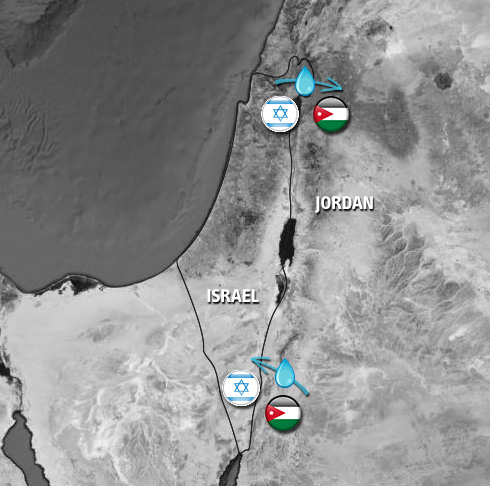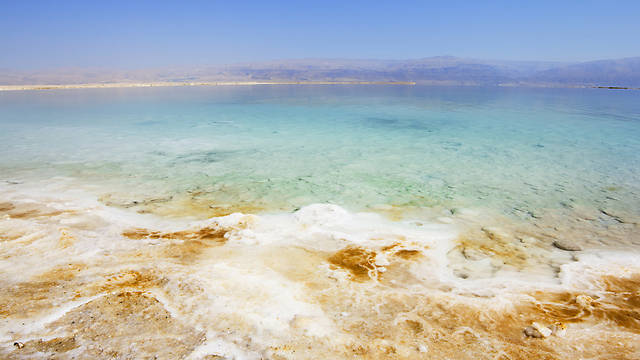
Minister Shalom: Water agreement fulfills Herzl's vision
Minister Silvan Shalom, who represents Israel in water deal signing with Jordan, PA in Washington, says accord is 'success story'. 'We proved we can all work together' says Palestinian water minister
The agreement was revealed Monday morning by senior Yedioth Ahronoth correspondant Nahum Barnea.
Related stories:
- Israel, Jordan, PA sign historic Two-Seas Canal deal
- Jordan, Israel in advanced talks on water deal
- Dead Sea faces shrinking, flooding
Energy Minister Silvan Shalom – who is also the minister for regional cooperation and infrastructure – represents Israel at the signing ceremony. Jordan and the Palestinian Authority are represented by their respective water ministers.
"This is a historic agreement which fulfills the vision of Herzl for the construction of a water canal," said the minister Monday evening. "We decided to execute the process in stages and the first stage is a water desalination plant in Aqaba (Jordan) and the pipeline to save the Dead Sea," added the minister.
Shalom noted that this is "another layer to peace with the Palestinian. It is a day of celebration with no cliches. We are implementing the trilateral agreement to help residents of the region, to save the Dead Sea, to supply water and electricity, and to bring about strategic, economic, and political cooperation. This is a success story."
The Israeli minister further added that "the damage of not doing anything is bigger than the cost of the project. We are progressing slowly because of ecological issues. Let's hope that this deal would be a hopeful window for regional peace."
Jordanian Water Minister Hazem Nasser stressed that the accord is not political: "This is an agreement with a humanitarian aspect, designed to aid those who need water. There is an ecological aspect as well since we are trying to save the Dead Sea."
He added: "Without water there will be no employment and poverty will spike. This is why we cooperate with our regional partners."
PA's minister in charge of water issues, Shaddad Attili, noted that "the agreement is unrelated to the Oslo Accords. The beauty is that this is a regional deal and it is important to everyone to save the Dead Sea. Despite political issues and the (Israeli-Palestinian) conflict, we proved that we can all work together."
According to the agreement, approximately 100 million cubic meters of water per year will be carried northwards, which will help slow the desiccation of the Dead Sea. The Jordanians will receive 30 million cubes for their own southern region and an additional 50 million cubes of grey-water from the Kinneret for the north.
The desalination plant constructed in Aqaba will allow the Israelis, Jordanians, and Palestinians to split millions of additional cubic meters of water.
Dead Sea trouble
As part of the agreement's negotiations, the Palestinians requested a foothold in the northern part of the Dead Sea, but Israel refused. Instead, the Palestinian Authority will receive approximately 30 million cubic meters from the Kinneret – either desalinated water or grey-water at production cost – which will increase water supplies for West Bank residents.
The entirety of the pipeline will be laid in Jordan, thus circumnavigating issues raised by environmental organizations in Israel. Barring unexpected delays, the construction of the pipeline and purification facility will be completed within four to five years.
Dov Litbinof, the head of Tamar council – which largely borders the Dead Sea – praised the agreement, but said that it would not contribute much to the environmental situation. "Just a drop in the ocean," he said.
"There is no disagreement that this accord is excellent for the relations and international cooperation with Jordan and the Palestinians, and it will also help many farmers in the Arava," he said.
He added: "This is a historic move and is really a breakthrough on this issue. But it will not help the Dead Sea. Every year the water level drops 120 centimeters (4 feet), which is approximately 1.6 billion cubic meters a year. Thus, any person who calculates the addition 100 million when 1.6 billion is subtracted understands the reality."
"It is my responsibility as the man in charge of the Dead Sea to do everything in my power to prevent the lowered water level every year. We need to keep fighting for new solutions," he concluded.
Matti Siver contributed to this report
- Receive Ynetnews updates directly to your desktop












